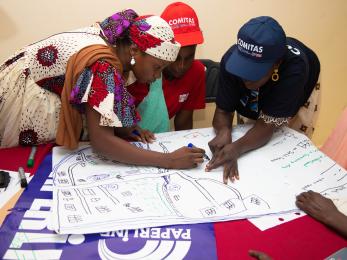Understanding Political Violence Among Youth

What makes youth prone to engage in violent movements? And what program strategies show the greatest potential to mitigate this risk? Mercy Corps recently undertook research to better understand these questions, based on data from its Local Empowerment for Peace (LEAP) project in Kenya. The study sheds light on the debate over whether young people’s economic conditions are a major driver of violence. It provides hard evidence on a number of social, political, and economic factors that influence youth propensity towards violence in Kenya. The findings have clear implications for peacebuilding programs in environments like Kenya where underlying tensions periodically erupt into violent conflict.
The results of this study lend support to the further use of economic incentives and promoting social integration among youth as pillars of peacebuilding programs in Kenya and similar contexts. The research also points to the need to expand young people’s political and civic engagement to significantly reduce their risk of participation in violent movements. Several Mercy Corps programs in Kenya and other countries have already internalized this lesson and are promoting constructive avenues for political participation among youth alongside efforts to improve their economic independence.


